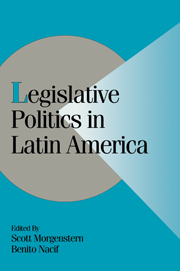Book contents
- Frontmatter
- Contents
- Tables and Figures
- Contributors
- Preface and Acknowledgments
- Party Names and Other Acronyms and Abbreviations
- 1 TOWARDS A MODEL OF LATIN AMERICAN LEGISLATURES
- Part I Executive–Legislative Relations
- 2 OSCILLATING RELATIONS: PRESIDENT AND CONGRESS IN ARGENTINA
- 3 PRESIDENTIAL CABINETS, ELECTORAL CYCLES, AND COALITION DISCIPLINE IN BRAZIL
- 4 EXAGGERATED PRESIDENTIALISM AND MODERATE PRESIDENTS: EXECUTIVE–LEGISLATIVE RELATIONS IN CHILE
- 5 EXECUTIVE–LEGISLATIVE RELATIONS: THE CASE OF MEXICO (1946–1997)
- Part II Political Parties and Legislative Structure
- Part III Legislatures and the Policy Process
- Part IV Conclusions
- References
- Author Index
- General Index
4 - EXAGGERATED PRESIDENTIALISM AND MODERATE PRESIDENTS: EXECUTIVE–LEGISLATIVE RELATIONS IN CHILE
Published online by Cambridge University Press: 14 January 2010
- Frontmatter
- Contents
- Tables and Figures
- Contributors
- Preface and Acknowledgments
- Party Names and Other Acronyms and Abbreviations
- 1 TOWARDS A MODEL OF LATIN AMERICAN LEGISLATURES
- Part I Executive–Legislative Relations
- 2 OSCILLATING RELATIONS: PRESIDENT AND CONGRESS IN ARGENTINA
- 3 PRESIDENTIAL CABINETS, ELECTORAL CYCLES, AND COALITION DISCIPLINE IN BRAZIL
- 4 EXAGGERATED PRESIDENTIALISM AND MODERATE PRESIDENTS: EXECUTIVE–LEGISLATIVE RELATIONS IN CHILE
- 5 EXECUTIVE–LEGISLATIVE RELATIONS: THE CASE OF MEXICO (1946–1997)
- Part II Political Parties and Legislative Structure
- Part III Legislatures and the Policy Process
- Part IV Conclusions
- References
- Author Index
- General Index
Summary
Introduction
With few exceptions, the scholarly study of Latin American legislatures has been tangential to the wider study of the executive branch and presidential authority. This is the case primarily because of the real disparities in power between branches of government in the region, but also because legislative branches have traditionally been perceived as either “rubber stamps” or impediments to the efficient execution of presidential policies. More recent literature treats legislatures more seriously, but still tends to focus on the executive side of the interbranch equation. This is, of course, due to the overwhelming strength or perceived strength of Latin American presidencies in many postauthoritarian democracies. Yet, scholars should not commit the same error again, simply revisiting the theme of executive predominance without a closer examination of the real and important role that legislatures play in the region.
Even in academic work that expresses a specific intent to examine Latin American legislatures, the president seems ultimately to end up playing the starring role. Part of the reason that presidents receive so much attention in work on legislatures is the very way in which legislative power is measured. As much as one tries to avoid it, a discussion of the legislature inevitably returns to a discussion of the executive branch, given the intricate and intimate relation between the two and the fact that legislative power is often conceptualized as the amount of influence that assemblies can exert over executive actions, in both the spheres of legislation and administrative oversight.
- Type
- Chapter
- Information
- Legislative Politics in Latin America , pp. 79 - 113Publisher: Cambridge University PressPrint publication year: 2002
- 48
- Cited by



